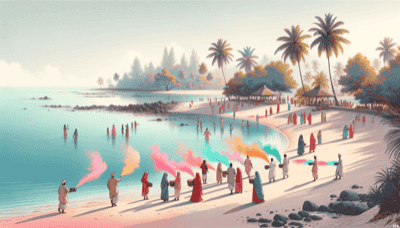We're here to help you keep count of the days to or since a date. Just click the button below and enter your chosen date to get started. Also choose the suggested days or search for a special day above #countingthedays

Holi, known as the Festival of Colors, is a vibrant and significant Hindu festival celebrated with great enthusiasm in Mauritius, an island nation with a substantial Hindu population. The festival usually takes place in February or March, on the last full moon day of the Hindu lunar month Phalguna.
The origins of Holi are rooted in ancient Hindu mythology, with various legends associated with it. One popular legend is that of Prahlad and Hiranyakashipu, which symbolizes the triumph of good over evil. The festivities incorporate this theme by encouraging people to forget past grievances and make amends.
Traditionally, Holi celebrations start with a Holika bonfire on the eve of Holi where people gather to perform religious rituals and pray for their inner evil to be destroyed. The next day is Rangwali Holi, where the play with colors takes center stage.
On the day of Holi:
Color Play: People smear each other with gulal (colored powders) and splash colored water, embodying joy and friendship. It's common to see groups singing, dancing, and playing drums.
Festive Foods: The festival is also marked by the sharing of festive foods such as gujiya (sweet dumplings), dahi vada (yogurt-soaked fritters), and thandai (a spiced milk drink), among other traditional delicacies.
Cultural Events: Cultural programs are organized across communities. These may include folk dances, music performances, and plays depicting scenes from Hindu mythology related to Holi.
Inclusivity: Although it is a Hindu festival, Holi in Mauritius sees participation from various communities across the island nation reflecting its multicultural ethos.
Public Spaces: Public spaces like beaches and parks become hubs for collective celebrations where families gather for picnics and friends meet for playful color fights.
Holi holds a distinct place in Mauritius' festive calendar as an occasion that reinforces social cohesion among its diverse population through shared traditions and revelry.